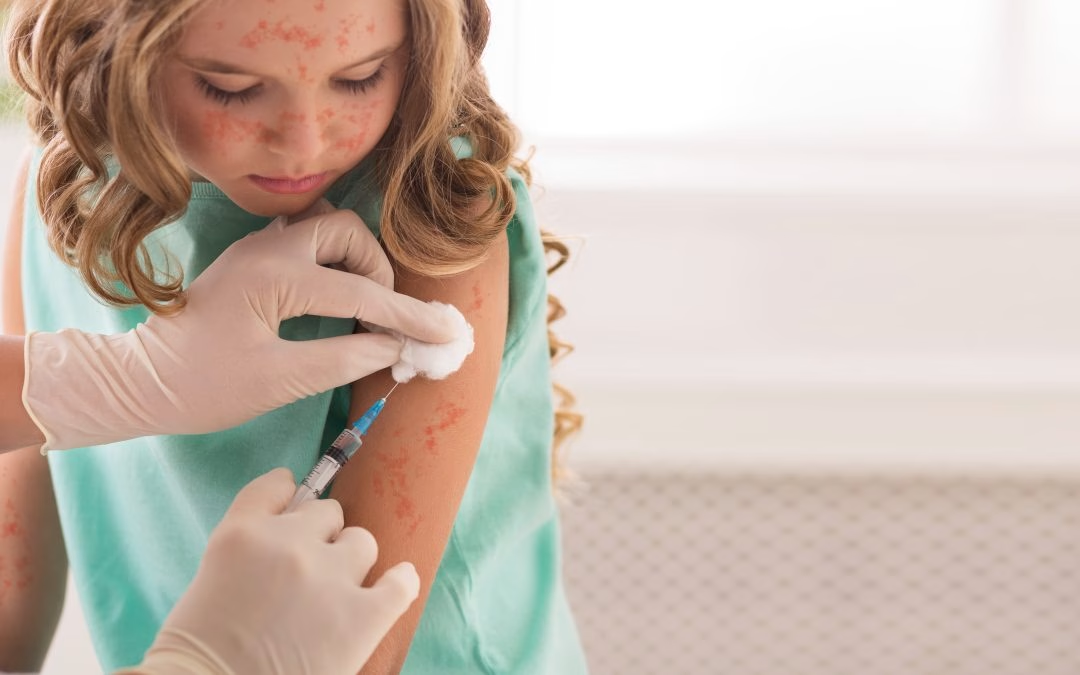by | Mar 13, 2024 | Family Health

How Important is the Measles Vaccine?
Like all parents, North Carolina parents of school-aged children are concerned about their health and well-being both at home and at school. Just before the start of their first year of school, kindergartners go for medical checkups and receive the vaccinations required by the state for enrollment. Data collected for the 2022-2023 school year by the U.S. Centers for Disease Control and Prevention (CDC) reveals an unsettling trend taking place among North Carolina’s school children. The data shows the overall measles vaccination rate for students at only 94% reflecting a 2% drop over the previous year putting it 1% below the ideal 95%. Non-medical vaccine exemption rates for the 2022-2023 academic year were at 2.3%, up from 1.8% in the previous year.
In 2000, the CDC declared measles eliminated within the country. However, recent data shows a concerning resurgence of cases reported across multiple states. From January to December of 2023, 20 states reported 58 measles cases, and yet, as of February 29, 2024, the CDC recorded 41 cases across 16 states. This outbreak highlights the crucial importance of measles vaccination in maintaining national health.
What is Measles?
Measles is a highly contagious respiratory virus that spreads through direct contact with an infected individual or through contact with their expelled respiratory droplets. The virus can survive on surfaces for up to two hours, making transmission easy in environments with close contact.
Typical Symptoms:
- High fever
- Fatigue
- Barky cough
- Red or bloodshot eyes
- Runny nose
Other measles symptoms may include:
- Sore throat
- White spots in the mouth
- Muscle pain
- Sensitivity to light
Days after these symptoms begin, a red, blotchy rash will develop spreading from the face and behind the ears to the rest of the body. The rash itself lasts about seven to 10 days.
The Importance of Vaccination
The measles vaccine is highly effective, providing up to 97% protection after the second dose. However, the declining vaccination rates in recent years are cause for concern among healthcare providers. More parents are seeking vaccine exemptions for their school-aged children while other parents are delaying the recommended vaccine schedule. The COVID-19 pandemic has compounded issues because healthcare has become difficult to get by causing parents to deviate from scheduled healthcare appointments. Together, these factors have contributed to a decrease in overall child vaccination coverage. This matters because maintaining a community vaccination rate of at least 95% is crucial to prevent outbreaks and protect vulnerable individuals.
Particularly vulnerable populations include infants, young children, pregnant women, and the immunocompromised. In infants, the immunity provided by their mother’s antibodies begins to wane in the first year. Vaccination is less effective in infants less than 6 months old due to lingering maternal antibodies. Children typically receive their first dose of measles vaccine between 12 and 15 months of age and the second dose between 4 and 6 years of age. Babies who are less than 12 months old and who have a known risk of exposure, such as an upcoming international trip, fall under a vaccination exception. Unvaccinated pregnant women who get measles are at higher risk for preterm labor and giving birth to low birthweight babies. Health officials do not recommend vaccination for pregnant women leaving them to rely on community vaccination levels for protection. Pregnant women can spread measles to their babies — either during the pregnancy, delivery, or while nursing.
Measles spreads when you interact with an infected individual by:
- Sharing food or drinks
- Kissing
- Shaking hands, holding hands, or hugging
- Touching a surface containing the virus and then touching your mouth, nose, or eyes.
Serious Measles Complications
One of the most devastating complications of measles is Subacute Sclerosing Panencephalitis (SSPE), a rare but fatal condition affecting the brain. SSPE can develop years after the initial measles infection, leading to cognitive and movement impairments, seizures, coma, and death. Prevention through vaccination is the only effective protection against SSPE, highlighting the importance of measles vaccination.
According to the CDC, children younger than 5 years of age and adults older than 20 years of age are most likely to suffer from measles-related complications. Children are particularly susceptible to measles-related complications, including ear infections, pneumonia, and encephalitis. Pneumonia in children stemming from a measles infection can be severe and is the leading cause of measles-related deaths. Though there is no cure, children with severe symptoms receive medically supervised Vitamin A supplementation on two consecutive days to reduce mortality and complications.
Maintaining high vaccination coverage is essential not only to protect individuals but also to prevent the spread of measles within communities. Travelers to areas with high measles incidence pose a risk of introducing the virus to communities with lower vaccination rates making global efforts to increase vaccination coverage crucial in combating the resurgence of this highly contagious virus worldwide, safeguarding the health of communities worldwide.
If you or your child has come into contact with the measles virus, visit AFC Urgent Care Monroe Road for prompt and comforting care for your family.


